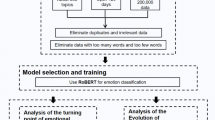Abstract
COVID-19 closures forced community residents to organize daily supply group purchasing for anti-epidemic needs. Public service satisfaction constitutes an important public health emergency governance indicator. Analyzing community group purchasing satisfaction emotional diffusion assists governments in timely, comprehensively grasping mass needs, resolving main public opinion development contradictions across stages, and maintaining stability amid special periods. User comment text spanning December 19, 2019 to August 2, 2021 was captured for five related Zhihu community topics. After cleaning, 2,034 items were utilized to calculate user emotional tendency scores. Ebbinghaus forgetting curves were then introduced for interpolation fitting to form complete community purchasing satisfaction time series. Regional influence on time series patterns was studied using three city Zhihu data. Autoregressive integrated moving average (ARIMA) models constructed with Wuhan and Shijiazhuang outbreak phase data predicted public opinion evolution regarding community purchasing satisfactio. Wuhan demonstrated “flat before, medium, tight and slow” characteristics. Shijiazhuang exhibited “low middle and high sides”. Guangzhou showed cyclical “steady-decreasing-rising” tendencies. Emotions gradually became cyclical and smooth. The research examines real-time public community group purchasing needs amid public health emergencies like epidemics from the public stance. Analyzing digital traces of public sentiments during crises provides data-driven insights to guide responsive governance. Further research should expand datasets across platforms and issues while refining techniques to extract signals from noise. Findings can illuminate universal public opinion dynamics to better predict future trajectories. Integrating computational social science, data science and psychology can strengthen collective resilience.
Access this chapter
Tax calculation will be finalised at checkout
Purchases are for personal use only
Similar content being viewed by others
References
Laato, S., Islam, A.K.M., Islam, M.N.: Why do people share misinformation during the Covid-19 pandemic? (2020). arXiv preprint arXiv:2004.09600
Zhao, R.Y., Chang, R.R., Chen, Z.: Research on the theme evolution of public health emergencies based on Zhihu. J. Inf. Resour. Manag. 11(02), 52–59 (2021)
Ma, X.Y., Sun, M.F.: Research on the Diffusion of Ethnic Cultures Integrating the Theme Evolution of Hot Events Library and information service, pp.106–117 (2022)
Cui, L., Wang, T., Zhu, T.: Information dissemination and public opinion evolution analysis based on complex network models. Physica A A 517, 125–136 (2019)
Cao, J., Xia, T., Li, J., Zhang, Y., Tang, S.: A systematic comparison of LDA and LDA-based topic models with application to news analysis. Proc. AAAI Conf. Artifi. Intell. 34(05), 7888–7895 (2020)
Yue, C., Morstatter, F., Shafiq, Z., Ferrara, E., Liu, H.: ARIMA-based forecasting of COVID-19 dynamics using Google Trends. Appl. Netw. Sci. 6(1), 1–22 (2021)
Zhang, S., Yao, L., Sun, A., Tay, W.: Sentiment Analysis: A Literature Review. In Applied Computing in Medicine and Health, pp. 109–116. Springer, Cham (2021)
Yang, F., Liu, Y., Yu, X., Yang, Q.: Modeling the evolution of user interests in social media. ACM Trans. Inf. Syst. 39(3), 1–33 (2021)
Chao, S., Cui, Y., Feng, J.: Data processing of intelligent IoT devices based on blockchain and edge computing. IEEE Internet Things J. 8(7), 5188–5197 (2021)
Author information
Authors and Affiliations
Corresponding author
Editor information
Editors and Affiliations
Rights and permissions
Copyright information
© 2024 The Author(s), under exclusive license to Springer Nature Singapore Pte Ltd.
About this paper
Cite this paper
Feng, X., Chen, J., Du, J., Wang, W. (2024). Users’ Emotional Diffusion and Public Opinion Evolution Under Public Health Emergencies: Taking the Community Group Purchasing on Zhihu as an Example. In: Sun, Y., Lu, T., Wang, T., Fan, H., Liu, D., Du, B. (eds) Computer Supported Cooperative Work and Social Computing. ChineseCSCW 2023. Communications in Computer and Information Science, vol 2012. Springer, Singapore. https://doi.org/10.1007/978-981-99-9637-7_19
Download citation
DOI: https://doi.org/10.1007/978-981-99-9637-7_19
Published:
Publisher Name: Springer, Singapore
Print ISBN: 978-981-99-9636-0
Online ISBN: 978-981-99-9637-7
eBook Packages: Computer ScienceComputer Science (R0)





